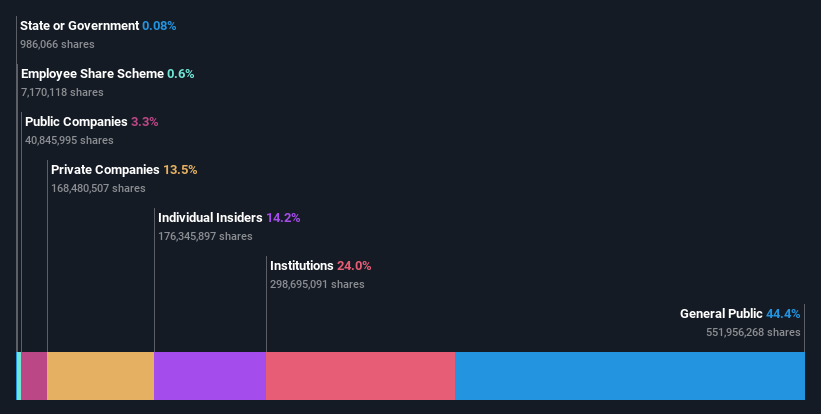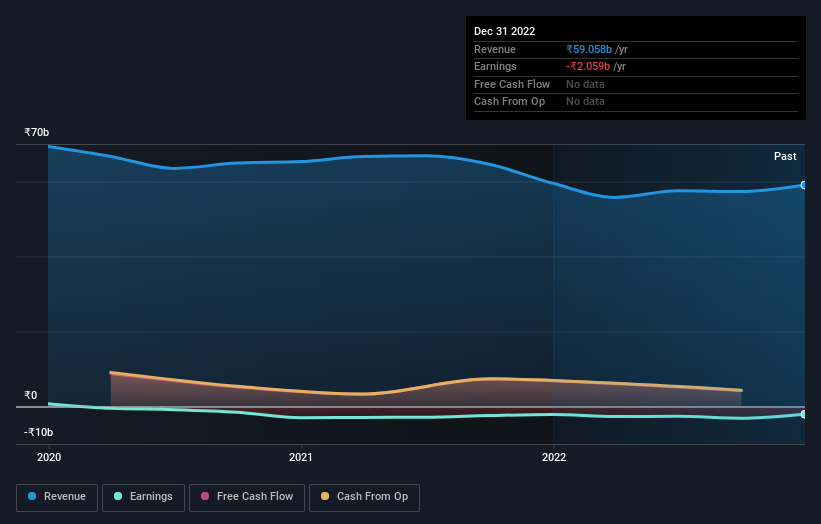Bajaj Hindusthan Sugar Limited's (NSE:BAJAJHIND) market cap touched ₹19b last week, benefiting both retail investors who own 44% as well as institutions

Key Insights
- Significant control over Bajaj Hindusthan Sugar by retail investors implies that the general public has more power to influence management and governance-related decisions
- 50% of the business is held by the top 15 shareholders
- Insiders own 14% of Bajaj Hindusthan Sugar
If you want to know who really controls Bajaj Hindusthan Sugar Limited (NSE:BAJAJHIND), then you'll have to look at the makeup of its share registry. And the group that holds the biggest piece of the pie are retail investors with 44% ownership. That is, the group stands to benefit the most if the stock rises (or lose the most if there is a downturn).
Retail investors gained the most after market cap touched ₹19b last week, while institutions who own 24% also benefitted.
Let's delve deeper into each type of owner of Bajaj Hindusthan Sugar, beginning with the chart below.
Check out our latest analysis for Bajaj Hindusthan Sugar

What Does The Institutional Ownership Tell Us About Bajaj Hindusthan Sugar?
Institutions typically measure themselves against a benchmark when reporting to their own investors, so they often become more enthusiastic about a stock once it's included in a major index. We would expect most companies to have some institutions on the register, especially if they are growing.
We can see that Bajaj Hindusthan Sugar does have institutional investors; and they hold a good portion of the company's stock. This implies the analysts working for those institutions have looked at the stock and they like it. But just like anyone else, they could be wrong. It is not uncommon to see a big share price drop if two large institutional investors try to sell out of a stock at the same time. So it is worth checking the past earnings trajectory of Bajaj Hindusthan Sugar, (below). Of course, keep in mind that there are other factors to consider, too.

We note that hedge funds don't have a meaningful investment in Bajaj Hindusthan Sugar. The company's largest shareholder is Kushagra Bajaj, with ownership of 7.7%. With 7.1% and 4.1% of the shares outstanding respectively, Bajaj Resources Limited and Central Bank of India, Asset Management Arm are the second and third largest shareholders.
After doing some more digging, we found that the top 15 have the combined ownership of 50% in the company, suggesting that no single shareholder has significant control over the company.
While studying institutional ownership for a company can add value to your research, it is also a good practice to research analyst recommendations to get a deeper understand of a stock's expected performance. Our information suggests that there isn't any analyst coverage of the stock, so it is probably little known.
Insider Ownership Of Bajaj Hindusthan Sugar
While the precise definition of an insider can be subjective, almost everyone considers board members to be insiders. Management ultimately answers to the board. However, it is not uncommon for managers to be executive board members, especially if they are a founder or the CEO.
I generally consider insider ownership to be a good thing. However, on some occasions it makes it more difficult for other shareholders to hold the board accountable for decisions.
It seems insiders own a significant proportion of Bajaj Hindusthan Sugar Limited. Insiders own ₹2.7b worth of shares in the ₹19b company. We would say this shows alignment with shareholders, but it is worth noting that the company is still quite small; some insiders may have founded the business. You can click here to see if those insiders have been buying or selling.
General Public Ownership
With a 44% ownership, the general public, mostly comprising of individual investors, have some degree of sway over Bajaj Hindusthan Sugar. This size of ownership, while considerable, may not be enough to change company policy if the decision is not in sync with other large shareholders.
Private Company Ownership
We can see that Private Companies own 14%, of the shares on issue. Private companies may be related parties. Sometimes insiders have an interest in a public company through a holding in a private company, rather than in their own capacity as an individual. While it's hard to draw any broad stroke conclusions, it is worth noting as an area for further research.
Public Company Ownership
It appears to us that public companies own 3.3% of Bajaj Hindusthan Sugar. This may be a strategic interest and the two companies may have related business interests. It could be that they have de-merged. This holding is probably worth investigating further.
Next Steps:
It's always worth thinking about the different groups who own shares in a company. But to understand Bajaj Hindusthan Sugar better, we need to consider many other factors. Consider for instance, the ever-present spectre of investment risk. We've identified 1 warning sign with Bajaj Hindusthan Sugar , and understanding them should be part of your investment process.
If you would prefer check out another company -- one with potentially superior financials -- then do not miss this free list of interesting companies, backed by strong financial data.
NB: Figures in this article are calculated using data from the last twelve months, which refer to the 12-month period ending on the last date of the month the financial statement is dated. This may not be consistent with full year annual report figures.
Valuation is complex, but we're here to simplify it.
Discover if Bajaj Hindusthan Sugar might be undervalued or overvalued with our detailed analysis, featuring fair value estimates, potential risks, dividends, insider trades, and its financial condition.
Access Free AnalysisHave feedback on this article? Concerned about the content? Get in touch with us directly. Alternatively, email editorial-team (at) simplywallst.com.
This article by Simply Wall St is general in nature. We provide commentary based on historical data and analyst forecasts only using an unbiased methodology and our articles are not intended to be financial advice. It does not constitute a recommendation to buy or sell any stock, and does not take account of your objectives, or your financial situation. We aim to bring you long-term focused analysis driven by fundamental data. Note that our analysis may not factor in the latest price-sensitive company announcements or qualitative material. Simply Wall St has no position in any stocks mentioned.
About NSEI:BAJAJHIND
Bajaj Hindusthan Sugar
Manufactures and sells sugar and alcohol in India.
Good value with mediocre balance sheet.
Market Insights
Community Narratives



